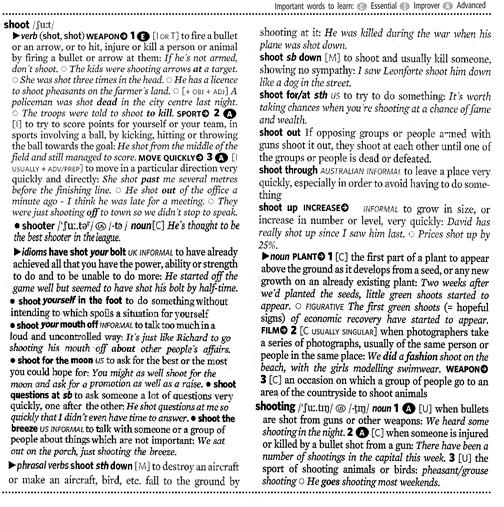题目内容
Consult the page adapted from an English dictionary and do Questions 45–48.
root1 /ru:t/ n [C]
1 ?PLANT? the part of a plant or tree that grows under the ground and gets water form the soil: Be careful not to damage the roots when repotting.| tree roots —see picture at germinate
2 ?CAUSE OF A PROBLEM? the main cause of a problem: Money is the root of all evil.| be/lie at the root of (="be" the cause of a problem) Often allergies are at the root of a lot of the problems.| get to the root of (="find" out the cause of a problem) | root cause (="the" main reason for a problem)
3 ?OF A CUSTOM/TRADITION? roots the origins of a custom or tradition that has continued for a long time: has its roots in Jazz has its roots in the folk songs of the southern states of the US.
4 ?OF AN IDEA/BELIEF? the main part of an idea or belief which all the other parts come from: be/lie at the root of Foucault is challenging the very root of 20th century liberalism.
5 ?FAMILY CONNECTION? sb’s roots your con- nection with a place because you were born there, or your family used to live there: Naita has come to Ghana in search of her roots.
6 put down roots if you put down roots somewhere, you start to feel that this place is your home and to have relationships with the people there
7 ?TOOTH/HAIR ETC? the part of a tooth, hair etc that fixes it to the rest of your body
8 take root a) if an idea takes root, people begin to accept or believe it: The concepts of democracy and free trade are finally beginning to take root.b) if a plant takes root, it starts to grow where you have planted it
9 have a (good) root round informal especially BrE to search for something by moving other things around
10 root and branch if you destroy something root and branch, you get rid of it completely and permanently because it is bad
11 ?LANGUAGE? technical the basic part of a word which shows its main meaning, to which other parts can be added: The suffix ‘ness’ can be added to the root ‘cold’ to form the word ‘coldness’.—compare stem1 (4)
12 ?MATHEMATICS? technical a number that when multiplied by itself a certain number of times, equals the number that you have: 2 is the fourth root of 16.
—see also cube root, square root, grass roots
root2 v
1 ?SEARCH? [I always + adv/prep] to search for something by moving things around: [+ through/in/ around] “Hang on a second,” said Leila, rooting through her handbag for a pen.| [+ for] pigs rooting for food
2 ?PLANT? a) [I] to grow roots: New shrubs will root easily in summer.b) [T usually passive] to fix a plant firmly by its roots: The bush was too firmly rooted in the hard earth to dig up easily.| root itself Clumps of thyme had rooted themselves between the rocks.—see also deeply rooted (deeply (5))
3 be rooted in to have developed from something and be strongly influenced by it: policies that are rooted in Marxist economic theory
4 be rooted to the spot to be so shocked, surprised, or frightened that you cannot move
root for sb phr v [T] informal 1 to give support and encouragement to someone in a competition, test or difficult situation, because you want them to succeed: Good luck – we’ll all be rooting for you! 2 especially AmE to support a sports team or player by shouting and cheering: We’ll all be rooting for the Dallas Cowboys in the Superbowl.
root sth ? out phr v [T] 1 to find out where a particular kind of problem exists and get rid of it: Racism cannot be rooted out without strong government action.2 informal to find something by searching for it: I’ll try and root out something suitable for you to wear.
root sth ? up phr v [T] to dig or pull a plant up with its roots
1.What’s meaning of the word “roots” in the sentence “Many Americans have roots in Europe.”?
A.The underground part of a plant. B.One’s connection with a place.
C.The origins of a custom or tradition. D.The main cause of a problem.
2.What’s the fourth root of 81?
A.27. B.9. C.6. D.3.
3.Which phrase can complete the sentence “Do you think it is possible to ____ crime?”
A.root for B.root out C.root up D.root through
4.In which of the following situations can we use the phrase “be rooted to the spot”?
A.A bush is so firmly rooted in the ground that it is difficult to pull it up.
B.A football fan got excited when his favorite football team scored a goal.
C.A girl became too scared to walk when she caught sight of a long snake.
D.A man is unable to walk because he was caught in a car accident years ago.
【小题1】B
【小题2】D
【小题3】B
【小题4】C
解析

 浙江之星课时优化作业系列答案
浙江之星课时优化作业系列答案 激活思维优加课堂系列答案
激活思维优加课堂系列答案Five people are at our table, including myself. I’ve already learnt a great deal about them in the short time we’ve been at sea, although we rarely meet except at mealtimes.
First of all, there is Dr. Stone. He is a man of about sixty-five, with gray hair and a friendly face. He gave up his work a short while ago and is now traveling round the world before he retires to some quite country village. As a young man, he served for many years as a doctor in the army and visited many countries. He’s told us a great deal about the city to which they are going.
Then there is “Grandmother”. I call her that because her name escapes me. In spite of being a grandmother, she looks remarkable young, no more than fifty. She is on her way to visit a daughter who went to Australia some years ago. Naturally she is very excited at the thought of seeing her again, and her three grandchildren, whom she has never seen.
Then there is a man I don’t care for very much, the engineer by the name of Barlow. He has been on leave in England and is now returning to his work in Singapore.
The other person who sits at our table is Mrs. Hunt. I’ve found out hardly anything about her. She’s extremely quiet and rarely talks, except to consult the doctor about children’s various illnesses. She is on her way to join her husband in India.
【小题1】What can we know about Mr. Stone?
| A. He knows a lot about the city the author is going to visit. |
| B.He is going to give up his work. |
| C.He has been retired for many years. |
| D.He is a doctor in the army now |
| A.Mrs. Hunt | B.Grandmother | C.The doctor | D.Mr. Hunt |
A. She looks old. B. he can’t think of her name
C. She has three daughters D he respects her
【小题4】The underlined phrase“on leave”in Paragragh 4 probably means _____.
| A.leaving | B.at home | C.about to leave | D.on vacation |
Consult the page adapted from an English dictionary and do Questions 
【小题1】
What does the phrase “green shoots” mean in “Green shoots have begun to appear in different markets”?
| A.Signs of recovery. | B.High prices. |
| C.Environmental protection. | D.Change in policy. |
Fill in the blank in the sentence “I can’t believe this is Joshua—he’s ______ since we last met!”
| A.shot out | B.shot through | C.shot up | D.shot down |
When you are talking about unimportant things, we say you are ______.
| A.shooting yourself in the foot | B.shooting the breeze |
| C.shooting your mouth off | D.shooting questions at somebody |
Choose a word to complete the sentence “The ______, which killed a policeman and wounded a passer-by, was reported to have lasted only 13 seconds.”
| A.shooter | B.shoot | C.shot | D.shooting |
